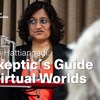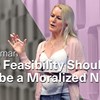sceptics
Jens Rydgren
I am Professor of Sociology at Stockholm University. My main areas of research are political sociology and ethnic relations. At Stockholm University I am currently directing a research projects where
Charles Manski: Seminar with a skeptic
Charles F. Manski On the 21st and 22nd of January this year Charles F Manski was in Stockholm, invited by the Institute for Futures studies to hold three lectures on his newly published book Public Poli.
Erez Maggor: Bidenomics, Industrial Policy, and the Twenty-First Century American Developmental State
Venue: Holländargatan 13, Stockholm Research seminar with Erez Maggor, Assistant Professor at Ben-Gurion University. He studies the political economy of industrial policy and innovation. Register here &

Anandi Hattiangadi: A Skeptic's Guide to Virtual Worlds - A response to David Chalmers
Are virtual worlds "real"? Or are they merely "virtual"? In a recent book by David Chalmers, "Reality + - Virtual Worlds and the Problems of Philosophy", he argues that if we in fact were already livi
How politically biased are you? New test on political biases
To what extent do you allow your political views influence your perception of reality? Do you trust facts regardless of whether they support your opinions or not? We may believe that we are impartial,
Daniel Cohnitz: Trust no one? The (social) epistemological consequences of belief in conspiracy theories
Daniel Cohnitz, Professor of Theoretical Philosophy, Utrecht University. Abstract Conspiracy theorists are typically skeptical about the trustworthiness of central governmental institutions. Some philos
Richard Bellamy: Taking Back Control: Why National Democracy Needs the EU, and the EU Needs National Democracy
Richard Bellamy, Professor of Political Science, UCL and Director of the Max Weber Programme, EUI. Visiting Professor at the University of Exeter. Abstract The muted popular support for, and certain faiI dispute this analysis. I argue that the EU’s role consists of supporting the democratic institutions of the member states, not least by enabling them to regulate their mutual interactions in non-dominating ways. From this perspective, the standard solution to the EU’s democratic deficit would create a domestic democratic deficit within each of the member states, one I contend democracy at the EU level would be unable to compensate for. Indeed, the current rise in Euro scepticism can be regarded as a product of this situation. By contrast, I suggest we conceive the EU as an association of democratic states, the decisions of which are under their joint and equal control. Drawing on the book, the talk will cover why such an arrangement is necessary, the norms that govern it, and the institutional framework required for it to work effectively and efficiently as well as equitably.
Malcolm Fairbrother (presenter): How Much Do People Value Future Generations? (paper together with Gustaf Arrhenius, Krister Bykvist, Tim Campbell, webinar)
Malcolm Fairbrother is professor of sociology at Umeå University and researcher at the Institute for Futures Studies. In this seminar he presents the paper How Much Do People Value Future Generations? C
Eva Erman: Why feasibility need not and should not be a moralized notion
Venue: Institute for Futures Studies, Holländargatan 13 in Stockholm, or online. Research seminar with Eva Erman, Professor of Political Science at Stockholm University. Her research focuses on democrat

Eva Erman: Why Feasibility Need Not and Should Not be a Moralized Notion
Research seminar with Eva Erman, Professor of Political Science at Stockholm University. Her research focuses on democratic theory, specifically on questions of democracy beyond the state, in a global








